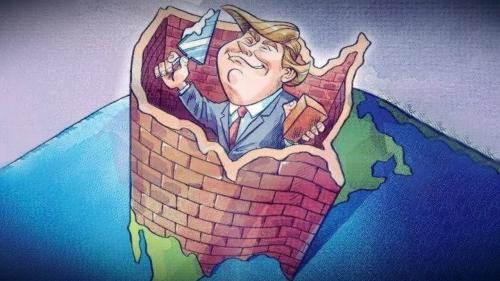Post-pandemic multilateralism? Or America alone
After four years in office, he and his team have weakened the multilateral order without any alternative... International relations are approaching a critical point.
- Opinión

The US president, who self-defined himself as a "tariff man", has engaged in direct aggression towards the multilateral organisations responsible for preserving peace and coexistence between nations and the international economic order. After four years in office, he and his team have weakened the multilateral order without any alternative. Given this, the main question is: what is the international relations scenario if this trend towards disarticulation continues? International relations are approaching a critical point.
The international order, based on the Pax Americana after WWII, consolidated US economic power and established the global political order through a structure of multilateral institutions such as the UN and her special agencies: International Monetary Fund, the World Bank, the General Agreement on Tariffs and Trade (later the World Trade Organization, WTO). They functioned as an "extended arm" of her foreign policy. The US President and his team have ignored this foreign policy orientation and destroyed many of its foundations.
In trade terms, almost immediately after his investiture, he put the brakes on the Trans-Pacific Partnership Agreement (TPP) negotiations and, shortly afterward, the Transatlantic Trade and Investment Agreement (TTIP) with the European Union, both begun during the Obama administration. In early 2018, he announced a series of tariffs on washing machines and solar panels unilaterally and later on steel and aluminum. In mid-2018, using the argument of unfair trade and tariff abuses, he pushed a trade war with China. At the end of that year, the renegotiation of a new North American Free Trade Agreement with Canada and Mexico concluded, but his threats of further tariffs continued.
The WTO's multilateral legal framework for trade was boycotted, since September 2018, by the US by putting the brakes on the process of renewing the body of judges of the dispute settlement body. Since the end of 2019, with the completion of the judges' term, the body is unable to resolve disputes. Finally, in May 2020, the WTO Director, Roberto Azevedo, presented his resignation from the Organisation, to join the multinational Pepsico as Head of Corporate Affairs. It became a headless institution without an arbitration body.
In military matters, the US government has expressed disdain for international agreements and multilateral organisations; spoken out against the North Atlantic Treaty Organisation (NATO) and even said it wished to withdraw. In 2018 it quit the Joint Comprehensive Action Plan, better known as the Iranian Nuclear Agreement, which committed Iran to eliminate its uranium reserves and not build any new reactors. In 2019 it pulled back from the Treaty on Intermediate-Range Nuclear Forces, which it had maintained with Russia since 1987 and limited the types of weapons it could develop. It also exited in 2020 from the Open Skies Treaty, which allows air surveillance flights over the 35 signatory countries' territory and promotes transparency in military forces and activities.
In 2017, the Trump government reneged from the Paris Agreement, which committed to reducing greenhouse gas emissions and taking action to mitigate climate change in the area of development and the environment. The same year, it departed from the talks at the United Nations for the Global Compact on Migration, which sought cooperation in migration management and refuge, because it violated US sovereignty. That same year, due to the sovereign recognition of Palestine, it left the United Nations Educational, Scientific and Cultural Organisation (UNESCO) and, for the same reason, the United Nations Human Rights Council (UNHRC).
Recently, amid the global health crisis caused by the COVID19, she once again turned her back on the multilateral order. First, the US announced her abandonment of the World Health Organisation (WHO), the pullback of medical personnel, and the closure of regional offices linked to the WHO, alleging corruption in the Organisation and covering up for China on the seriousness of the pandemic. Shortly after that, she refused to participate in the Global Vaccine Access Service for COVID19 (Covax), which seeks cooperation to develop, produce, and equitably distribute the vaccine because WHO coordinates the effort.
The quitting of and confrontation with multilateral institutions has weakened the world order. In the face of the most severe economic crisis in capitalism and an unresolved global health crisis, international cooperation has to move forward without the USA, or even despite it. The critical point for multilateralism is not only the elections to the US executive next November. The Pax Americana's multilateralism horizon is about to end, to be replaced by a directly led unilateral US order. Instead, faced with this multifaceted crisis, a new era of cooperation and international relations has begun with different structures, new economic forces, and China's significant involvement with other emerging economies.
Num.25, Year 2020, September 17th
- Armando Negrete, Academic Technician, Economic Research Institute, UNAM, member of obela.org
Del mismo autor
- El déficit público de EE.UU. y sus efectos globales en el 2021 14/10/2021
- The US public deficit and its global effects in 2021 13/10/2021
- New commodity price hikes 24/08/2021
- Nueva alza de precios en las materias primas 24/08/2021
- The United States after Trump 07/05/2021
- Estados Unidos después de Trump 07/05/2021
- Brexit and Britain’s decline 04/03/2021
- El Brexit y el declive británico 04/03/2021
- The world economy towards the end of 2020 18/11/2020
- La economía mundial hacia fines del 2020 18/11/2020
Clasificado en
Clasificado en:
Poscovid19
- Alastair Crooke 11/01/2022
- Michael Roberts 03/01/2022
- Armando Negrete 24/08/2021
- Armando Negrete 24/08/2021
- Boaventura de Sousa Santos 27/07/2021
